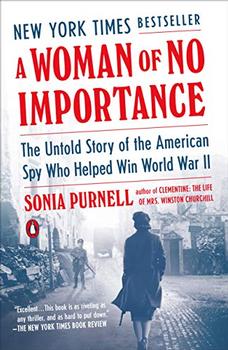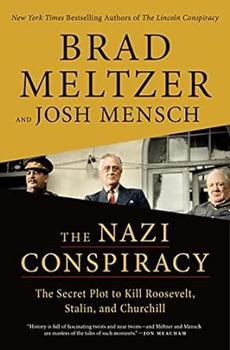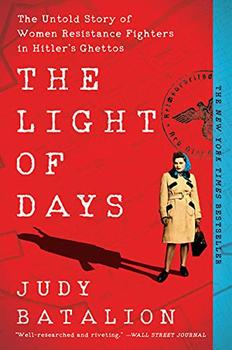Summary | Excerpt | Reading Guide | Reviews | Beyond the book | Read-Alikes | Genres & Themes | Author Bio

The Untold Story of the American Spy Who Helped Win World War II
by Sonia PurnellVirginia Hall is largely unknown in the annals of history, but her World War II accomplishments were magnificent. A Woman of No Importance: The Untold Story of How an American Spy Won World War II lovingly bestows upon Virginia Hall the notoriety and acclaim she rightly deserves.
As a young woman, Hall studied at the École Libre des Sciences Politiques in Paris and was obsessed with the city and its stars. She found herself enchanted with the black entertainer Josephine Baker, writers Ernest Hemingway and F. Scott Fitzgerald, and feminist Gertrude Stein. What was not in Paris were rules, limitations, segregation. She felt free and wanted an adventurous life.
After school, Hall moved to Turkey, where she would suffer her greatest tragedy. During a hunting party, her gun accidentally discharged and put a hole in her foot. An infection spiraled upwards, and in the aftermath of hospitalizations and surgeries, her leg had to be amputated. When she returned to the United States for further care, Hall was somber and in misery. How was she to have adventures on one leg?
By making the best out of her circumstances: she quickly taught herself to walk on the wooden leg, which she named Cuthbert.
After Germany attacked Poland, Hall had her chance to pursue heroism: she went to work in London for the Special Operations Executive (SOE). SOE was created in June 1940 when newly appointed Prime Minister Winston Churchill ordered three existing organizations to be merged into one unit. It was to be a brutal group of undercover agents who bombed, stole secrets and caused Nazi havoc. In reality, SOE had trouble finding agents. They weren't in the position to reject a one-legged adrenaline junkie. So in 1941, Hall became SOE's first female agent in France. She was sent to France as Marie Monin, a New York Post reporter.
The spy's information smuggling, her secret communications and rescue missions—she coordinated a bold escape for 12 imprisoned men—made Marie Monin a legendary figure in France. The more successful she was at thwarting the Nazis, the more she was hunted.
If Hall had ever been caught there is little doubt she would have been tortured. French authorities under German occupation could be worse than the Germans, as they were trying to impress the Nazis to save their own necks.
Eventually, her cover was blown and she had to get out of France. Fast. A large reward was offered for her arrest. "I'd give anything to get my hands on that limping Canadian bitch" one of her enemies, Klaus Barber, known as The Butcher of Lyon, reportedly said. Thousands of wanted posters were taped to poles with her picture on it and the caption: 'The Enemy's Most Dangerous Spy. We must find and destroy her.'
Back in London, SOE forbade Hall from returning to France; but 16 months later she was back there, working for the Office of Strategic Services (OSS), the precursor to the CIA. She dyed her hair and filed down her teeth to disguise herself as a peasant woman. Her job was to coordinate sabotage operations and hit and run attacks on behalf of the Americans.
Hall began training men in four groups of twenty-five. Diane was her new code name and her trainees were called the Diane Irregulars. Their motto was: shoot, burn, destroy, leave. They paralyzed communications, packed explosives on roadways, removed road signs and replaced them with fake ones to confuse the Germans.
OSS's sabotage efforts were incredibly successful. Over the course of WWII, the organization recruited fearless saboteurs such as Hall, and it forced German prisoners-of-war to act as spies on counterintelligence missions. At its height, it employed close to 24,000 workers. Referring to partisan operations in general, President Eisenhower remarked that the ambush, harassment, and ruining of the Nazi morale shortened the war by eight months.
Page after page, Sonia Purnell delivers a breathless and breathtaking thriller. But as powerful as Hall's story is, and as much as it is a testament to fearless women, it doesn't answer a singular question about the spy. Why does a woman who summered on a Maryland farm leave her homeland to water down the evil of the Third Reich? She could have lived a life of comfort and safety. But she put everything on the line as she redirected the arc of evil and saved the lives of strangers. Hall was the only civilian woman honored with the Distinguished Service Cross, an award for heroism.
Virginia Hall the fighter is part of our rich story of dynamic women. She was a leader of men. A spy. A legend. We often hear the cliché of being the good we want to see in the world. 75 years ago that was the soul of a woman, a striking and attractive American, a woman with one leg and a purpose to free humankind.
![]() This review was originally published in The BookBrowse Review in July 2019, and has been updated for the
April 2020 edition.
Click here to go to this issue.
This review was originally published in The BookBrowse Review in July 2019, and has been updated for the
April 2020 edition.
Click here to go to this issue.

If you liked A Woman of No Importance, try these:

by Brad Meltzer, Josh Mensch
Published 2024
From the New York Times bestselling authors of The First Conspiracy and The Lincoln Conspiracy comes the little-known true story of a Nazi plot to kill FDR, Joseph Stalin, and Winston Churchill at the height of World War II.

by Judy Batalion
Published 2022
One of the most important stories of World War II, already optioned by Steven Spielberg for a major motion picture: a spectacular, searing history that brings to light the extraordinary accomplishments of brave Jewish women who became resistance fighters - a group of unknown heroes whose exploits have never been chronicled in full, until now.
Your guide toexceptional books
BookBrowse seeks out and recommends the best in contemporary fiction and nonfiction—books that not only engage and entertain but also deepen our understanding of ourselves and the world around us.